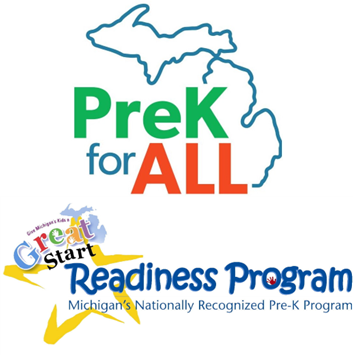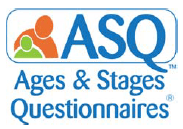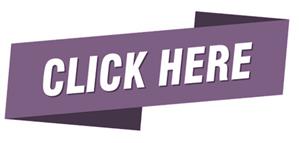- UCS Community Education
- Early Childhood
- PreK for All
-
PreK for All

-
2026-2027 PreK for All Pre-Application is now open!
The PreK for All Program is a free preschool program funded through the Michigan Department of Education.
All 4-year-olds are eligible for PreK for All.
For the 2026-2027 school year, children must be 4 years old on or before September 1, 2026.
*Age waivers for students born between September 2, 2022 and on or before December 1, 2022 may be accepted after July 1, 2026.Interested families must create an Eleyo account and complete the PreK for All application.
Contact our office to apply for the current 2025-2026 school year (586) 797-6930
-
Big news for little learners! I’m happy to share that Utica Community Schools Early Childhood is participating in the PreK for All initiative, bringing FREE PreK to our community.
PreK for All is Here!
Thanks to a historic investment in the state budget, access to free, high quality PreK has expanded in Michigan! Starting in the fall of 2024, all Michigan four-year-olds can qualify for free PreK education. It’s available right here in Utica Community Schools!
What is PreK for All?
This is an initiative to ensure that every 4-year-old child in Michigan, regardless of where they live, has access to free, full-time, high-quality PreK, prioritizing those who need it most. Research shows attending a quality PreK program has a positive impact on a child’s life by preparing them for success in kindergarten and beyond.
What This Means for Your Family:
- Quality Learning. Michigan’s PreK program is ranked #1 in the nation for quality.
- Social Skills. Children learn to share, take turns and get along.
- Kindergarten Readiness. At this age, children’s brains are like sponges. They soak in early math, science and reading skills.
Utica Community Schools Early Childhood offers PreK for All to families through our Great Start Readiness Program (GSRP).
We offer:
- Half and full day options
- Currently at 11 locations throughout the District
- Before and after care (additional cost at limited locations)
We are excited about the positive impact PreK for All will have on our community, our children and our families. If you have any questions or need assistance with the application process, please don’t hesitate to reach out to the PreK for All office at (586)797-6930 or prekforall@uticak12.org.
Please pass the word about PreK for All to other parents you know who could benefit from free PreK. Let’s work together to give our youngest learners the best possible start in their educational journey!
-
Application Process
Step1
Families will create an Eleyo account through Utica: https://ucscommunityeducation.ce.eleyo.com/
Step 2
Families will complete the PreK for All Program application through Eleyo.
Step 3
A UCS PreK for All representative will contact you to schedule an intake appointment to complete the registration process and paperwork.
Step 4
Families will complete the intake appointment.
The following documents will be required for the scheduled appointment:
- Income documentation (2024 Federal Income Tax form (1040), W-2, check stubs (1 month of work), SSI, DHS, court-ordered child support, unemployment verification
- Child’s original birth certificate
- Parent or guardian’s driver’s licenses
- Copy of child’s immunization record
- Immunization waiver (if applicable)
- Proof of residency (lease/rental agreement, mortgage documents, property tax bill)
- IEP (if applicable)
By completing the application on Eleyo, your child will be added to our waitlist. A UCS PreK for All representative will contact you by August to schedule an appointment to complete the registration process. 2025-26 registration appointments continue throughout the year. The 2025-26 school year begins in September. Final placement and classroom confirmation takes place in late August.
-
School Year Forms
School Year Forms
-
Classroom Curriculum
Creative Curriculum Objectives for Development and Learning
All UCS Early Childhood programs utilize the Teaching Strategies', Creative Curriculum®, a comprehensive, research-based curriculum that features exploration and discovery as a way of learning. The components of The Creative Curriculum® for Preschool were designed specifically to provide in-depth support for all children and for the unique demands of each day in a preschool classroom. At the core of this curriculum, are 38 research based objectives for development and learning that focus on major areas of development including: social-emotional, physical, language, cognitive, literacy, mathematics, science and technology, social studies, the arts and English language acquisition.
SOCIAL–EMOTIONAL
1. Regulates own emotions and behaviors
a. Manages feelings
b. Follows limits and expectations
c. Takes care of own needs appropriately
2. Establishes and sustains positive relationships
a. Forms relationships with adults
b. Responds to emotional cues
c. Interacts with peers
d. Makes friends
3. Participates cooperatively and constructively in group situations
a. Balances needs and rights of self and others
b. Solves social problems
PHYSICAL
4. Demonstrates traveling skills
5. Demonstrates balancing skills
6. Demonstrates gross-motor manipulative skills
7. Demonstrates fine-motor strength and coordination
a. Uses fingers and hands
b. Uses writing and drawing tools
LANGUAGE
8. Listens to and understands increasingly complex language
a. Comprehends language
b. Follows directions
9. Uses language to express thoughts and needs
a. Uses an expanding expressive vocabulary
b. Speaks clearly
c. Uses conventional grammar
d. Tells about another time or place
10. Uses appropriate conversational and other communication skills
a. Engages in conversations
b. Uses social rules of language
COGNITIVE
11. Demonstrates positive approaches to learning
a. Attends and engages
b. Persists
c. Solves problems
d. Shows curiosity and motivation
e. Shows flexibility and inventiveness in thinking
12. Remembers and connects experiences
a. Recognizes and recalls
b. Makes connections
13. Uses classification skills
14. Uses symbols and images to represent something not present
a. Thinks symbolically
b. Engages in sociodramatic play
LITERACY
15. Demonstrates phonological awareness, phonics skills, and word recognition
a. Notices and discriminates rhyme
b. Notices and discriminates alliteration
c. Notices and discriminates discrete units of sound
d. Applies phonics rules and knowledge of word structure to decode text
16. Demonstrates knowledge of the alphabet
a. Identifies and names letters
b. Identifies letter-sound correspondences
17. Demonstrates knowledge of print and its uses
a. Uses and appreciates books and other texts
b. Uses print concepts
18. Comprehends and responds to books and other texts
a. Interacts during reading experiences, book conversations, and text reflections
b. Uses emergent reading skills
c. Retells stories and recounts details from informational texts
d. Uses context clues to read and comprehend texts
e. Reads fluently
19. Demonstrates writing skills
a. Writes name
b. Writes to convey meaning
c. Writes using conventions
MATHEMATICS
20. Uses number concepts and operations
a. Counts
b. Quantifies
c. Connects numerals with their quantities
d. Understands and uses place value and base ten
e. Applies properties of mathematical operations and relationships
f. Applies number combinations and mental number strategies in mathematical operations
21. Explores and describes spatial relationships and shapes
a. Understands spatial relationships
b. Understands shapes
22. Compares and measures
a. Measures objects
b. Measures time and money
c. Represents and analyzes data
23. Demonstrates knowledge of patterns
SCIENCE AND TECHNOLOGY
24. Uses scientific inquiry skills
25. Demonstrates knowledge of the characteristics of living things
26. Demonstrates knowledge of the physical properties of objects and materials
27. Demonstrates knowledge of Earth’s environment
28. Uses tools and other technology to perform tasks
SOCIAL STUDIES
29. Demonstrates knowledge about self
30. Shows basic understanding of people and how they live
31. Explores change related to familiar people or places
32. Demonstrates simple geographic knowledge
THE ARTS
33. Explores the visual arts
34. Explores musical concepts and expression
35. Explores dance and movement concepts
36. Explores drama through actions and language
ENGLISH LANGUAGE ACQUISITION
37. Demonstrates progress in listening to and understanding English
38. Demonstrates progress in speaking English -
Child Assessment

The first 5 years of life set the stage for success in school and for a lifetime.
The Ages & Stages Questionnaire-3 (ASQ-3) and The Ages & Stages-Social Emotional (ASQ-SE2) are screening tools that ask questions about your child's overall and social-emotional development, looking at how children are doing in the important areas of communication, physical ability, social skills, and problem-solving skills.
These screens can help identify your child's strengths, as well as, any areas where your child may need support. The screening would take about 10-20 minutes to answer questions about your child.
Your individual information is protected to ensure confidentiality. Information is entered on a web-based database that is secure and password protected. Identifying information from the screen will be seen only by the developmental screening specialist, who scores your screening and provides the results to you.
General information about the ages and results of children's screening scores are compiled at the Macomb Intermediate School District in order to better understand the strengths and challenges of the children living in Macomb County.
-
Free PreK for All Contact Information:
Phone: (586) 797-4660
Office Hours: 8:00 am-4:30 pm
prekforall@uticak12.org


